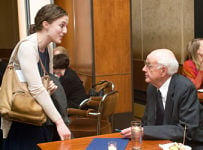
http://goo.gl/
The Dillard University Center for Teaching, Learning & Academic Technology Blog
Teaching Dossier Academy – June 4 through 8 2012 Windsor, Ontario, Canada
Inside Higher Ed: Daily News Update May 3, 2012
EduDemic
|
|
Posted: 02 May 2012 02:34 PM PDT
Whoa. And you thought Google was helpful when it came to finding
new education resources. There's a new search engine on the block that's
making waves in the edu-world. It's called Noodle and it's designed just for
teachers, students, and education administrators. What could be better than
that?
|
|
Posted: 02 May 2012 10:00 AM PDT
A word of warning to any current student who wants to get a job
at some point. At any point. The web is permanent and your future employer
knows how to find you.
|
|
Posted: 02 May 2012 09:30 AM PDT
If you're looking to start discussing religion in your
classroom, why not do so as visually as possible? What better way to do that
than with an infographic?
|
|
Posted: 02 May 2012 07:25 AM PDT
It has been said that imagination is more important than
knowledge, and for any experienced classroom teacher it is easy to see daily
evidence of this.
|
|
Posted: 02 May 2012 06:32 AM PDT
Harvard and MIT just anounced edX. It's quite possibly the
biggest change to online learning in recent memory. But it's not because of
who is involved. It's because of something else.
|
EduDemic: May 3, 2012
TLT-SWG
|
| Tolman's
Metacognitive Instruments re “Overcoming Student Resistance” to
learner-centered methods #TLTGFrLv May 2, 2012
Posted: 02 May 2012 12:26 PM PDT
Anton Tolman's
Metacognitive Instruments based on Transtheoretical Model of Change (TTM) Oct-Dec 2011. Following excerpts are from "Read First: Explanation of Metacognitive Instruments for Helping Students Become More Effective Learners" Anton Tolman, Utah Valley University "Transtheoretical Model of Change (TTM) as described by Prochaska and DiClemente. This model describes three inter-related concepts: Readiness to Change (the degree to which the person is ready to adopt new behaviors and to make genuine changes in his/her life), Self-Efficacy (the set of beliefs of the person about their ability or capacity to make a change) and Decisional Balance (the person’s own assessment of the benefits and costs of making a change -- whether they feel inclined to approach or avoid the change). All three of these constructs are useful in understanding student behavior and motivation in classes and their reactions to active learning assignments and courses. " ..."Instruments and Procedures in this Collection:
§ Interpreting the TTM - document for
students explaining the TTM
§ Self-Efficacy - Students (and Key)
"The way I use these instruments in my
classes is generally as follows:
1) First day of class, have them complete the TTM-S either in class or online before class2) By 2nd class, have them complete the RSPQ online or bring to class3) Do NOT give the keys to the students; I quickly score their TTM Surveys and let them know their stages usually via email or our course Learning Management System (LMS)4) By the next class period following my feedback to them of their stage, the PLP is due5) By the next class period after that, their LSSA1 is due; the LSSA2 is due just after the mid-term exam, and the LSSA3 is due the week before class ends6) The week before class ends, I also ask them to complete the TTM and RSPQ again and to reflect on how their scores have changed (or not) since the start of the semester
"Note:
I have a specific course objective related to helping students to become more effective learners, so we create time in class to discuss these issues throughout the semester. I generally grade the instruments as complete or incomplete. For the LSSA, full score is obtained if they complete all items and questions and the reflections are genuine. For the PLP, score is based on if they complete all elements of the assignment and due so honestly and with genuine reflection.
"I
have also included a document that describes the above procedure in this collection called 'Using Metacognitive Instruments in Class'.”
IMAGE selected by Steve Gilbert 20120502
Photo of "Police trying to hold back barricades from the crowd." 1 January 2012, "Source Occupy Wall Street Facebook Page (https://fbcdn-sphotos-a.akamaihd.net/hphotos-ak-ash4/381472_261040913963890_217514361649879_729151_405588896_n.jpg)" http://upload.wikimedia.org/wikipedia/commons/4/40/Police_stuggle_with_barricades.jpg http://commons.wikimedia.org/wiki/File:Police_stuggle_with_barricades.jpg By Occupy Wall Street [CC0], via Wikimedia Commons "Licensing This file is made available under the Creative Commons CC0 1.0 Universal Public Domain Dedication. The person who associated a work with this deed has dedicated the work to the public domain by waiving all of his or her rights to the work worldwide under copyright law, including all related and neighboring rights, to the extent allowed by law. You can copy, modify, distribute and perform the work, even for commercial purposes, all without asking permission." |
TLT-SWG May 3, 2012
 BOOK WITH BUZZ
BOOK WITH BUZZ
.jpg)
Inside Higher Ed Insider Update May 2012